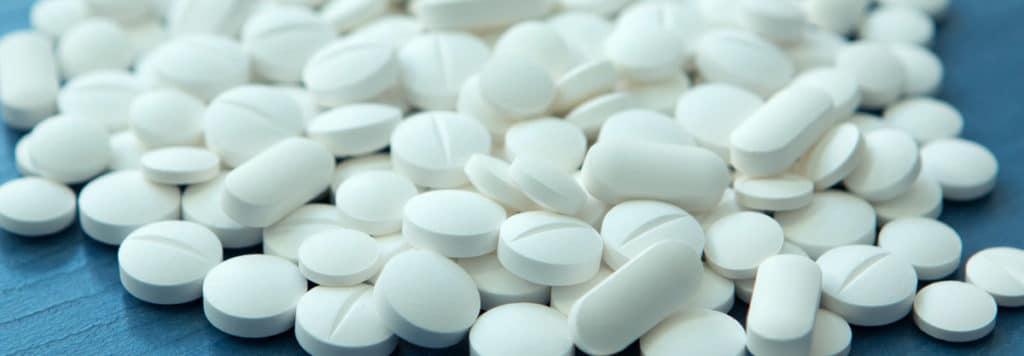Updated August 5th, 2025
When we think about over-the-counter medications, we typically associate them with a low potential for abuse and harm. After all, they’re extremely easy to obtain, so shouldn’t they be safe? Unfortunately, loperamide, sold in an over-the-counter anti-diarrhea drug called Imodium, is being abused by increasing amounts of opioid addicts in the United States.
Table of contents
Abusing Loperamide for Withdrawal Symptoms
Loperamide (sold as Imodium) is an over-the-counter anti-diarrhea medicine that is extremely safe when taken at recommended doses but can produce a high when taken at extremely high doses.
It is an opioid derivative that is intended to treat acute and chronic diarrhea. When used as directed, loperamide does not reach the opioid receptors in the brain because a naturally-occurring protein in the body pumps it out of the brain before it can get that far.
On the contrary, when loperamide is taken at very high doses, or in conjunction with another over-the-counter drug, that natural pumping function is overwhelmed and the brain’s opioid receptors are flooded with the drug.
To achieve that euphoria or high, some loperamide abusers take extremely large amounts of the drug each day. According to an article published by The Atlantic, some users take 400 to 500 tablets per day by putting them in a blender and making a smoothie. Loperamide is also frequently abused in an effort to combat withdrawal symptoms and online forums have detailed instructions on using it to treat opioid withdrawal.
Using loperamide for withdrawal symptoms may work in theory, but there are too many risks for it to be a wise option. People who abuse loperamide to detox or for withdrawal from opioids risk overdosing, as extremely high doses of the drug are required to alleviate some of the withdrawal symptoms associated with opioid detox. Additionally, using loperamide for detox and withdrawal can damage the intestines, liver, cause respiratory depression, or even lead to fatal heart problems. Not to mention, a person always risks becoming addicted to the loperamide itself, even if they overcome the opioid addiction.
Although this drug normally has a low abuse potential, the fact that it is cheap, easy to purchase, and legal makes it an attractive option for opioid abusers who can’t get their hands on illegal opioid drugs or opioid prescription painkillers.
How Common Is Loperamide Abuse?
A recent analysis of National Poison Data System (NPDS) reports shows that nearly 13,000 cases of intentional loperamide exposure—including misuse, abuse, and suspected suicide—were logged from 2010 to 2022. Between 2010 and 2015 alone, cases rose by 91%, averaging 38 additional annual exposures, and by 2015, about one-third involved teens and young adults in their 20s. Although overall exposure rates began to decline after 2017, the proportion of serious medical outcomes—including hospital admissions, critical care treatment, and death—remained elevated through 2022. Approximately 13.4% of cases involved serious injury or fatality, with 59 recorded deaths, most linked to misuse. Public health surveillance suggests that FDA warnings and packaging restrictions introduced between 2016 and 2018 helped reduce misuse, but risks such as cardiac toxicity and overdose persist.
WebMD originally reported a tenfold increase in web forum posts about loperamide misuse (for either opioid withdrawal relief or to “get high”) between 2010 and 2011. Poison control center data shows a 71% rise in loperamide-related calls between 2011 and 2014. More recent analyses confirm that misuse cases nearly doubled from 2009 to 2015, a trend that plateaued after 2017 but still leaves a significant number of serious medical outcomes related to cardiac toxicity and overdose.
Impacts remained worrisome: about 13% of these reported exposures led to major health effects or fatalities, and many involved teens and young adults in their 20s. While misuse rates declined following mounting public warnings and restrictions, loperamide abuse continues to pose a dangerous, overlooked overdose risk.
Physical Effects of Loperamide Abuse
Despite the fact that it is very safe when taken as directed, the effects of loperamide abuse are extremely dangerous. According to an article published in the international journal Annals of Emergency Medicine, loperamide abuse is associated with abnormal rapid heart rhythms and death. Between 2010 and 2022, intentional loperamide exposures—including misuse and suspected abuse—were tracked via the National Poison Data System. Among these cases, approximately 13.4% involved serious cardiac toxicity or major medical outcomes, including documented conduction abnormalities, arrhythmias, and occasional fatalities.
According to the FDA, short-term effects of loperamide abuse and misuse may vary based on the amount taken and whether it was taken with another drug. Physical side effects may include:
- Abnormal heart rhythms
- Rapid heartbeat
- Euphoria
- Fainting
- Cardiac arrest
- Unresponsiveness
The long-term consequences of loperamide abuse are not fully known at this time, but the drug has similar effects on the brain and body as other opioid drugs, including depressed breathing, drowsiness, and even death.
Treatment for Loperamide Abuse and Opioid Addiction
Attempting to treat your own opioid withdrawal symptoms with loperamide is very dangerous and inefficient. If you or a loved one is suffering from opioid addiction, the best way to get sober and manage uncomfortable withdrawal symptoms is to enroll in a medically assisted drug detox program, not by using loperamide for withdrawal.
Briarwood Detox Center offers medically assisted drug detox for opioid addiction and all other addictive substances. We provide medical monitoring 24/7 for individuals undergoing detox and our staff is trained to recognize and treat the physical and psychological symptoms of opioid withdrawal.
Drug detox doesn’t have to be an uncomfortable and dreadful experience. At Briarwood, we strive to make it as safe and comfortable as possible with a compassionate staff, a comfortable home-like environment, and high-quality, individualized care.
If you or a loved one is currently abusing loperamide or some other opioid drug, we can help. Contact Briarwood today to learn more about our individualized drug detox programs and begin your journey to sobriety. We can assist you with drug detox in Austin, drug detox in San Antonio, and drug detox in Houston.
